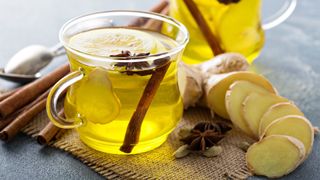Does tea really help with digestion?
It’s a good source of antioxidants, but does tea help digestion?

Digestive issues like bloating, stomach cramps and constipation can be difficult to deal with. So in the search for relief, does tea help digestion?
There's certainly some health benefits to a humble cup of tea. For one, it's a rich source of antioxidants. These compounds may reduce the risk of certain chronic diseases, according to the Academy of Nutrition and Dietetics.
But when it comes to digestion, promises of weight loss and anti-bloating teas often sound too good to be true. And they most likely are. A lot of the research behind the benefits of tea is based on herbal extracts, consumed in larger quantities than the amounts found in tea. Therefore, it's hard to tell whether a single cup of tea could provide the same benefits.
Whilst occasional digestive discomfort is not necessarily cause for concern, it is worth consulting a doctor if symptoms are persistent in order to rule out underlying conditions.
What is "good" digestion?
Nancy Z. Farrell Allen, a registered dietitian in Illinois and a national spokesperson for the Academy of Nutrition and Dietetics, said that digestion is the process where our food is broken down into smaller, absorbable units. This enables the body to convert nutrients into energy and excrete the rest as waste.
"Good digestion would imply that this process is working effectively and efficiently for the proper absorption of nutrients with minimal, if any, bodily discomfort, followed by the natural elimination of some food waste," she said.
The digestive system spans from the esophagus to the anus, with each part playing a role.
But the digestive process does not always run smoothly. Multiple factors can affect it, including:
- Food intolerances
- Stress
- Sleep issues
- Allergies
- Alcohol
- Dietary problems
- Lack of exercise
- Chronic conditions
Lifestyle factors like poor diet can also make a difference.

Does tea help digestion?
Drinking tea is comforting and may be more likely to aid against abdominal discomfort or bloating, said Farrell Allen. But is there more to tea than its soothing properties?
"Tea may offer comfort by helping to regulate the gut flora, reduce inflammation, or aid in gastrointestinal motility [bowel movements]," she said.
Whether you prefer your tea black, green or herbal could also make a difference, said Dr. Laura Purdy, a family medicine physician in Tennessee. "Different types of tea may help with digestive dysfunctions," she said. "For example, peppermint oil, and thus presumably peppermint tea, can help with irritable bowel syndrome-related symptoms."
Peppermint's soothing qualities could be due to a substance called Piperita L. Menthacarin. According to a 2018 review, published in the journal Nutrients, this promotes the relaxation of muscle tissue. Another 2018 study in the journal Alimentary Pharmacology and Therapeutics shows that peppermint oil positively impacts digestive health.
However, we do not know how far these findings are transferable to drinking peppermint in tea form, because the strength and dose would be different. There could be similar benefits, but there isn't specific evidence to back them up.
It's a similar story with ginger tea. "Ginger tea may help with nausea and vomiting, and is also safe to use when pregnant," said Purdy.
A 2015 review in the European Review for Medical and Pharmacological Sciences, found that ginger extract could play a role in soothing nausea symptoms. But again, we do not know if these findings apply to ginger tea.

Fennel is another traditional go-to for digestive issues. "It may have several positive impacts on the digestive system, ranging from soothing stomach ulcers to improvement of constipation," said Purdy.
However, drinking tea is not a magic bullet for digestive complaints. It is important to speak to a doctor to identify any underlying causes of digestive discomfort and to find an appropriate treatment plan.
What does the science say about tea and digestion?
Evidence suggests that regularly drinking tea can support digestive health in the long term. One 2012 study in The American Journal of Clinical Nutrition found that people who drink an "average" amount of tea — around three times a week for more than six months — are less likely to develop cancer in the digestive tract compared with those who don't drink tea.
Yet the level of evidence varies depending on your choice of beverage. "Studies indicate that the flavonoids in black and green tea have antioxidant properties, which can calm the digestive tract and may reduce the risk of gastric and esophageal cancer," said Farrell Allen.
A 2019 systematic review in the journal Nutrients also suggests that black, green, and oolong tea may favorably shift the balance of the gut microbiome by encouraging the growth of beneficial bacteria. However, more research is needed.

"Some studies suggest that drinking black, green, or oolong tea may be associated with weight loss," added Farrell Allen. This could be due to their ability to increase the levels of beneficial bacteria in the human intestine, she said.
"As for herbal teas, there are few studies, yet fennel, peppermint and ginger have all been used in teas to aid digestive health," said Farrell Allen.
It's worth checking with your doctor before adding herbal tea to your routine, especially as certain varieties can interact with medications.
This article is for informational purposes only and is not meant to offer medical advice.
Sign up for the Live Science daily newsletter now
Get the world’s most fascinating discoveries delivered straight to your inbox.

Meg Walters is a freelance journalist and features writer. Raised in Canada and based in South East London, Meg covers culture, entertainment, lifestyle, and health. Her work has appeared in Cosmopolitan, i-D, Refinery29, Stylist, GQ, Shondaland, Healthline, HelloGiggles and other publications.
When she's not writing, Meg is probably daydreaming about traveling the world, re-watching an old rom-com with a glass of wine, or wasting time on Twitter, where you can follow her @wordsbymeg.
